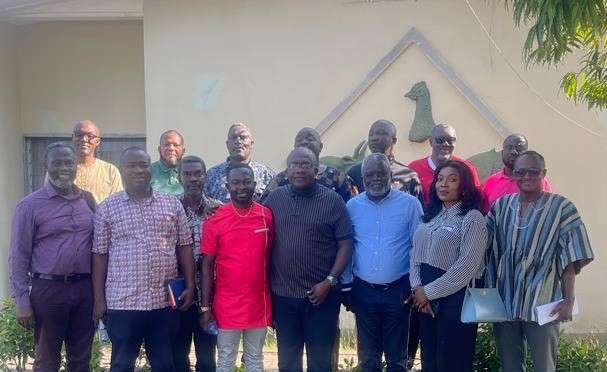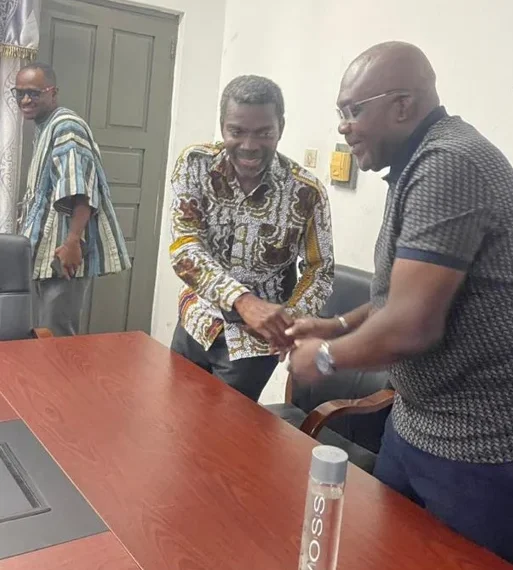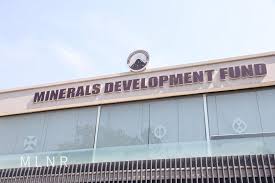JL Plantations, a leading agro-tourism company in Ghana, and WES Trade Limited, a Maltese firm specializing in innovative agricultural solutions, have signed a Memorandum of Understanding (MoU) with the University of Cape Coast (UCC) to revolutionize commercial agriculture in Ghana.
The partnership aims to harness advanced technologies such as artificial intelligence (AI), deep machine learning, and smart sensors to optimize agricultural practices, contributing to Ghana’s agricultural value chain and overall food security.
The MoU brings together several key stakeholders, including the Ministry of Agriculture, which oversees agricultural initiatives across the country. Dr. Daniel Opoku Mensah, CEO of JL Plantations, played a key role in securing this strategic partnership, emphasizing that the collaboration represents a significant milestone for Ghana’s agriculture sector.
“We have already interacted with the Ministry and all the divisional directors to showcase what we have, and they were enthused,” Dr. Mensah remarked during the signing ceremony. He further revealed that JL Plantations had engaged with the Ministry of Education to integrate a Maltese AI solution known as Irrigoptimal into the curricula of two STEM schools in Ghana. The Irrigoptimal solution is designed to address climate change challenges by optimizing water usage through AI.
Establishing Living Labs to Drive Innovation
As part of the agreement, JL Plantations, WES Trade, and UCC will establish Living Labs at three farm sites. These labs will serve as testing grounds for integrating new agricultural technologies, with WES Trade providing essential resources and expertise in AI, machine learning, and advanced sensor systems. These tools will be critical in enhancing productivity and sustainability in agriculture.
According to Dr. Mensah, JL Plantations will be responsible for the logistical setup, training, and maintenance of the Living Labs, while UCC will provide its expertise in research, access to laboratories, and technical support. The collaborative effort is expected to lead to the implementation of pilot research projects that will serve as blueprints for future agricultural advancements.
The Living Labs will offer an open platform for researchers, students, and farmers to work together on innovative projects. The labs will collect data to refine agricultural solutions, develop new project ideas, and present findings at national events. This collaborative approach aims to elevate Ghana’s agriculture sector by using data-driven insights to improve farming practices and address issues such as pest control, irrigation efficiency, and disease prevention.
Transforming Agriculture and Tourism in Ghana
JL Plantations, under Dr. Mensah’s leadership, is also spearheading efforts to create a unique agricultural and tourism ecosystem in Ghana. This ecosystem integrates various agricultural ventures, including an Agro-Tourism Resort, Aquaculture Value Chain, Aqua-Sports and Recreation, Plantation Crop Development, Afforestation, Land Reclamation, and the production of natural mineral water and processed food products. Through these initiatives, JL Plantations seeks to build a sustainable business environment that supports both agricultural productivity and rural development.
The agro-tourism resort and associated activities will not only attract visitors but also create a platform for educating the public on agricultural value chains and the importance of sustainable farming. Dr. Mensah noted, “The business seeks to create an agricultural value chain cum creative tourism that brings measurable benefits to key stakeholders and establishes a sustainable business environment for the enhancement of Agro-Tourism Productivity and Rural Development.”

Dr. Mensah also highlighted the need for innovation in the agricultural sector, emphasizing the shift from small-scale farming to a more commercial and technology-driven approach.
“We think that small-scale agriculture cannot propel the agricultural revolution that we have in mind for Ghana and particularly Africa. Therefore, because of this vision and mission, we have always tried to look out for technology that will formulate us, and for that matter, we got engaged with a Maltese company – WES Trade.”
Dr. Daniel Opoku Mensah
The Role of Technology in Transforming Agriculture
WES Trade’s expertise in AI and machine learning will be central to the success of this partnership. The company specializes in using advanced algorithms to monitor pest and disease outbreaks, as well as optimizing water usage for irrigation – a critical issue for both humans and plants. As Dr. Mensah pointed out, “Water is vital for both humans and plants, which cannot relocate to find new water sources, prompting our decision to enter this partnership.”
Irrigoptimal, WES Trade’s AI-powered irrigation system, will play a crucial role in this project. This innovative technology uses sensors and AI to track moisture levels in the soil, ensuring that crops receive the right amount of water at the right time. By reducing water wastage and increasing efficiency, the system is expected to significantly improve agricultural productivity in Ghana.
The partnership also includes a focus on export-oriented crops such as pineapples and vegetables. With UCC’s involvement, the project will not only demonstrate the practical application of these technologies but also position Ghana as a leader in agricultural innovation.
Dr. Mensah is optimistic that the collaboration will successfully showcase the benefits of the Living Labs and prove that the Irrigoptimal system can function effectively on both university research farms and farmers’ fields.
“We want to prove that Irrigoptimal functions optimally on farmers’ fields and at the university research stations,” Dr. Mensah emphasized, pointing to the broader potential for scaling this technology across Ghana’s agriculture sector.
READ ALSO: Akufo-Addo, Bawumia Called Out Over Failure to Act on Galamsey



















